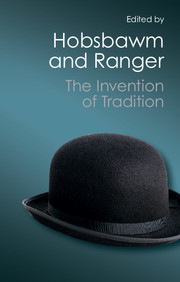Book contents
- Frontmatter
- Contents
- Contributors
- 1 Introduction: Inventing Traditions
- 2 The Invention of Tradition: The Highland Tradition of Scotland
- 3 From a Death to a View: The Hunt for the Welsh Past in the Romantic Period
- 4 The Context, Performance and Meaning of Ritual: The British Monarchy and the ‘Invention of Tradition’, c. 1820–1977
- 5 Representing Authority in Victorian India
- 6 The Invention of Tradition in Colonial Africa
- 7 Mass-Producing Traditions: Europe, 1870–1914
- Index
6 - The Invention of Tradition in Colonial Africa
Published online by Cambridge University Press: 05 July 2014
- Frontmatter
- Contents
- Contributors
- 1 Introduction: Inventing Traditions
- 2 The Invention of Tradition: The Highland Tradition of Scotland
- 3 From a Death to a View: The Hunt for the Welsh Past in the Romantic Period
- 4 The Context, Performance and Meaning of Ritual: The British Monarchy and the ‘Invention of Tradition’, c. 1820–1977
- 5 Representing Authority in Victorian India
- 6 The Invention of Tradition in Colonial Africa
- 7 Mass-Producing Traditions: Europe, 1870–1914
- Index
Summary
INTRODUCTION
The 1870s, 1880s and 1890s were the time of a great flowering of European invented tradition – ecclesiastical, educational, military, republican, monarchical. They were also the time of the European rush into Africa. There were many and complex connections between the two processes. The concept of Empire was central to the process of inventing tradition within Europe itself, but the African empires came so late in the day that they demonstrate the effects rather than the causes of European invented tradition. Deployed in Africa, however, the new traditions took on a peculiar character, distinguishing them from both their European and Asian Imperial forms.
By contrast to India many parts of Africa became colonies of white settlement. This meant that the settlers had to define themselves as natural and undisputed masters of vast numbers of Africans. They drew upon European invented traditions both to define and to justify their roles, and also to provide models of subservience into which it was sometimes possible to draw Africans. In Africa, therefore, the whole apparatus of invented school and professional and regimental traditions became much more starkly a matter of command and control than it was within Europe itself. Moreover, in Europe these invented traditions of the new ruling classes were to some extent balanced by the invented traditions of industrial workers or by the invented ‘folk’ cultures of peasants. In Africa, no white agriculturalist saw himself as a peasant. White workers in the mines of southern Africa certainly drew upon the invented rituals of European craft unionism but they did so partly because they were rituals of exclusiveness and could be used to prevent Africans being defined as workers.
- Type
- Chapter
- Information
- The Invention of Tradition , pp. 211 - 262Publisher: Cambridge University PressPrint publication year: 2012
- 73
- Cited by



